A day before the 2021 NHL Draft, Kyle Dubas discussed his abiding belief in the team’s core players, the probable loss of Zach Hyman, the decision to protect Justin Holl in the expansion draft, the team’s lack of picks in the draft, and the team’s offseason plans.
Prior to the start of the interview, Dubas recognized Nashville Predators prospect Luke Prokop’s decision to come out as gay, describing it as, “extremely courageous, and it was also great to see the tremendous support in the hockey world for Luke.”
Kyle Dubas on Zach Hyman: “We have tried to extend ourselves as best we can knowing there would be a strong market for him”
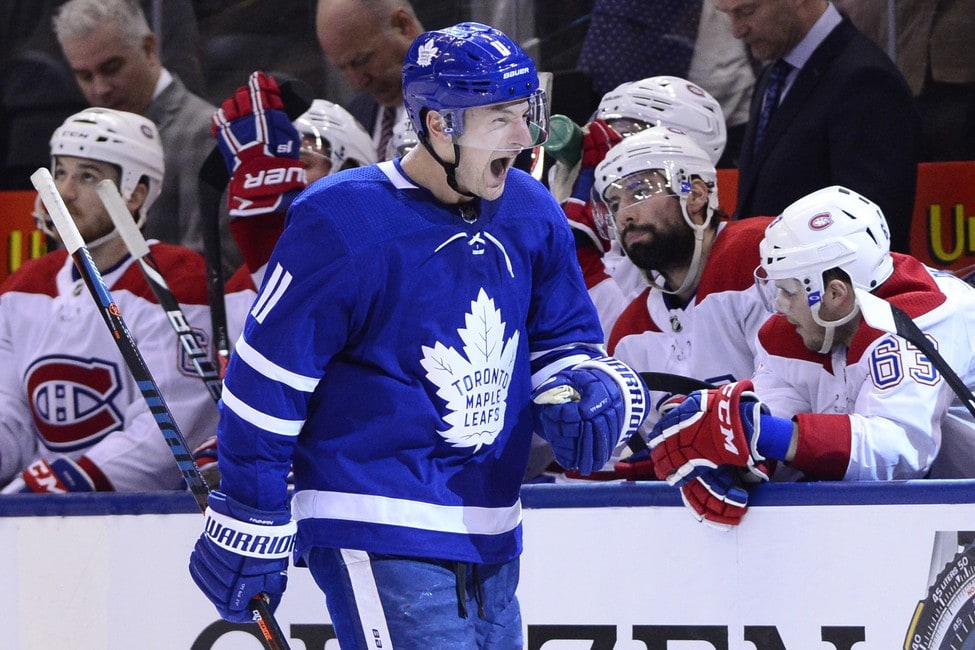
It looks like Zach Hyman might be moving on from the team. Are you still hoping to retain his services? If not, what is it going to take to replace what he brought for you guys?
Dubas: Certainly, it was our intention going in to retain Zach’s services. He has been an excellent player for us throughout his entire career here. I think everyone loves him as a player and a person. We have certain limits we can go to. We have tried to extend ourselves as best we can knowing there would be a strong market for him.
About a week or eight days ago now, we gave Todd Reynolds and Zach permission to speak to other teams to move the process along so that we would have a better picture heading into free agency as to where we actually stood and how we could go about trying to replace Zach if that was going to be the conclusion.
At this time, I have not heard from Todd regarding the reports this morning, so I can’t comment too deeply on that.
Would you be open to a sign-and-trade if that is something that presented itself?
Dubas: We are open to anything that can help make our team better. If there is fair value to be had there, we will certainly explore it.
If you do lose Zach, how do you replace what he brings to the table? Talking about intangibles, he could be the poster child for it.
Dubas: I don’t disagree with you. Zach has shown, night in and night out, that he is going to give his very best to the Toronto Maple Leafs. We certainly have valued that over the years and that is why we have tried to find a solution here.
Zach has earned every dollar that he is going to get in free agency. He has done it certainly not the easy way as well. As we go through this, especially with the salary cap being what it is, there are going to be hard decisions to make — and it is going to be on myself, more than anyone else in the management group — to replace the talent and the different intangibles a player brings to the room and also continue to see growth from our players who have already signed here in those areas.
All indications are that he is going to Edmonton. Is that what you expect here by the end of the day?
Dubas: I really don’t know. I haven’t had communication from Todd Reynolds on the matter here today. I have not had communication with Todd since those reports started. If I hear from Todd on it and something happens, we will go from there.
Kyle Dubas on the expansion draft: “We just did not think [Justin Holl] was replaceable”
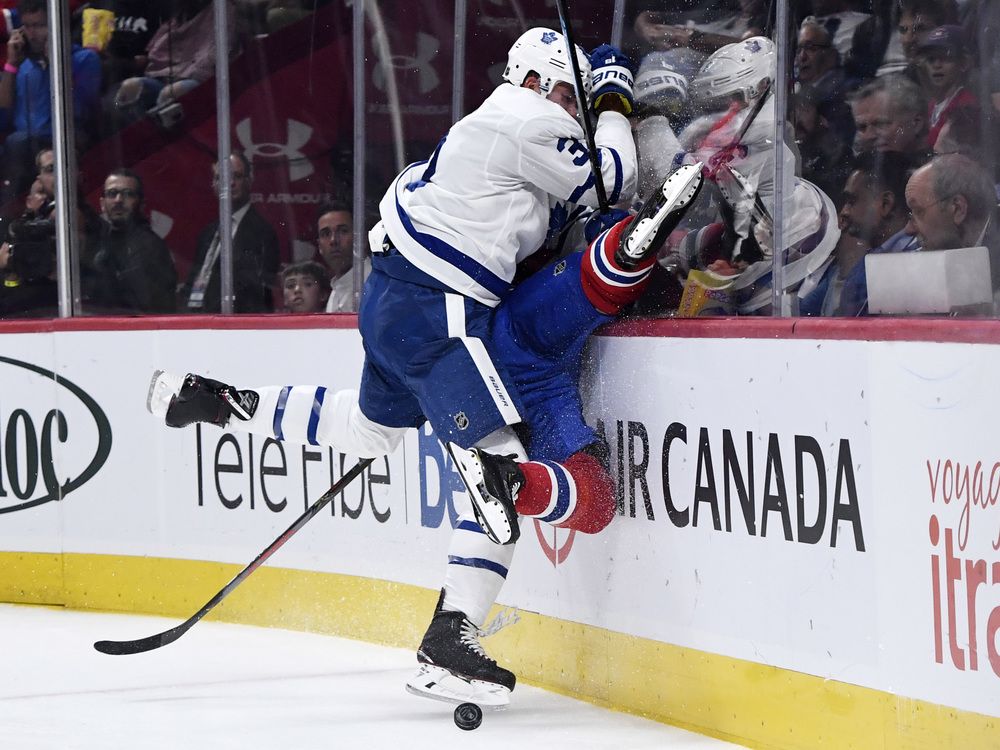
When you got Jared McCann at such a reasonable price, were you at all tempted to change your thinking and go 7-3-1?
Dubas: We thought about it. I would understand why you would look at it. It wasn’t just a case of going 7-3-1 because the cost was low. It was also, if we go 7-3-1, who would we be losing, and what would the cost be to replace that person at their current cap hit?
That would give us increased exposure on defense, and we knew what the market was shaping up to be in terms of free agents. I think that manifested itself a little bit last night. We also knew what the available players were and what we thought they were.
I understand why someone would look at it that way and think we should’ve kept Jared or others, but our view of it, having more complete information and analyzing the different options, there was that option, but there was also going to be a cost to replace the player we lost at that cap hit in the marketplace or via trade. It just didn’t add up to us in a net positive way.
We elected to keep the strategy as is, but we did look at it and investigate it for countless days prior to the trade and in subsequent hours after.
Can you expand on protecting Justin Holl over a couple of the forwards?
Dubas: The way we looked at it was — what do we have in Justin, and what do we have for the future? He is signed for two more years. He has taken, in the last two seasons, major steps. I understand he is 29 years old, but he is extremely well-conditioned. There is very low mileage on him overall.
Holl and Muzzin together as a tandem, especially in the first three-quarters of the season, played against the other team’s best players. In our division, those were not a lot of easy nights if you go to Edmonton, Vancouver, we saw what Montreal did after they beat us, Calgary… every team in our division — Winnipeg with their top line — had very challenging players to defend against. Jake and Justin took that role on and performed very well in it.
At the end of the season and in the playoffs, maybe you could say the effects [were felt] of all of that over the course of the season — travel, and the way the season impacted them, I am not sure — but we know what he is capable of and we know who he is as a person. We have a strong belief in him. He is signed for two more years.
If he is gone from our team in either expansion or trade, can we replace what he brings at the cap hit? We went through it dozens of different ways and looked at many different iterations knowing what the marketplace was saying about him, what Seattle was likely to do, and we looked at the alternatives. You could say, “We have guys internally,” but then you are back to the thing we chased for years, which is sacrificing defensive depth and trying to supplement it by signing someone who is inferior to him for around the same cap hit.
That was the decision that we made. We just did not think he was replaceable. We have a lot of belief he is going to have a great summer and set himself up to perform at his best for 82 games and in the playoffs. Knowing Justin Holl, I would bet that he does it over the course of the next two seasons. Two years from now, we will look back, I will be on the record of believing in him, and I know he will play very well for us.
As for the defensive depth, do you envision signing another Zach Bogosian type, or do you look internally for growth there?
Dubas: We would like to give both Sandin and Liljegren every opportunity. We have to begin converting some of these guys from prospects. Maybe we have blocked them a little bit. They have to earn it, so I am not going to say we need to clear the path, but I think we will try to focus on a defenseman that maybe perhaps brings a little bit more power and presence in the way that Zach did. [Kristians] Rubins has that a little bit as a prospect for us, but we are not flush with it.
We will look, in free agency and trade, to continue to address that. I thought Zach [Bogosian] brought a lot for us last season. We will stay in touch with him as well as we get into free agency.
Dubas on the 2021 draft: “From October 2020 to July 2021, we will add 15 new prospects to our system — that is the way that we viewed it”
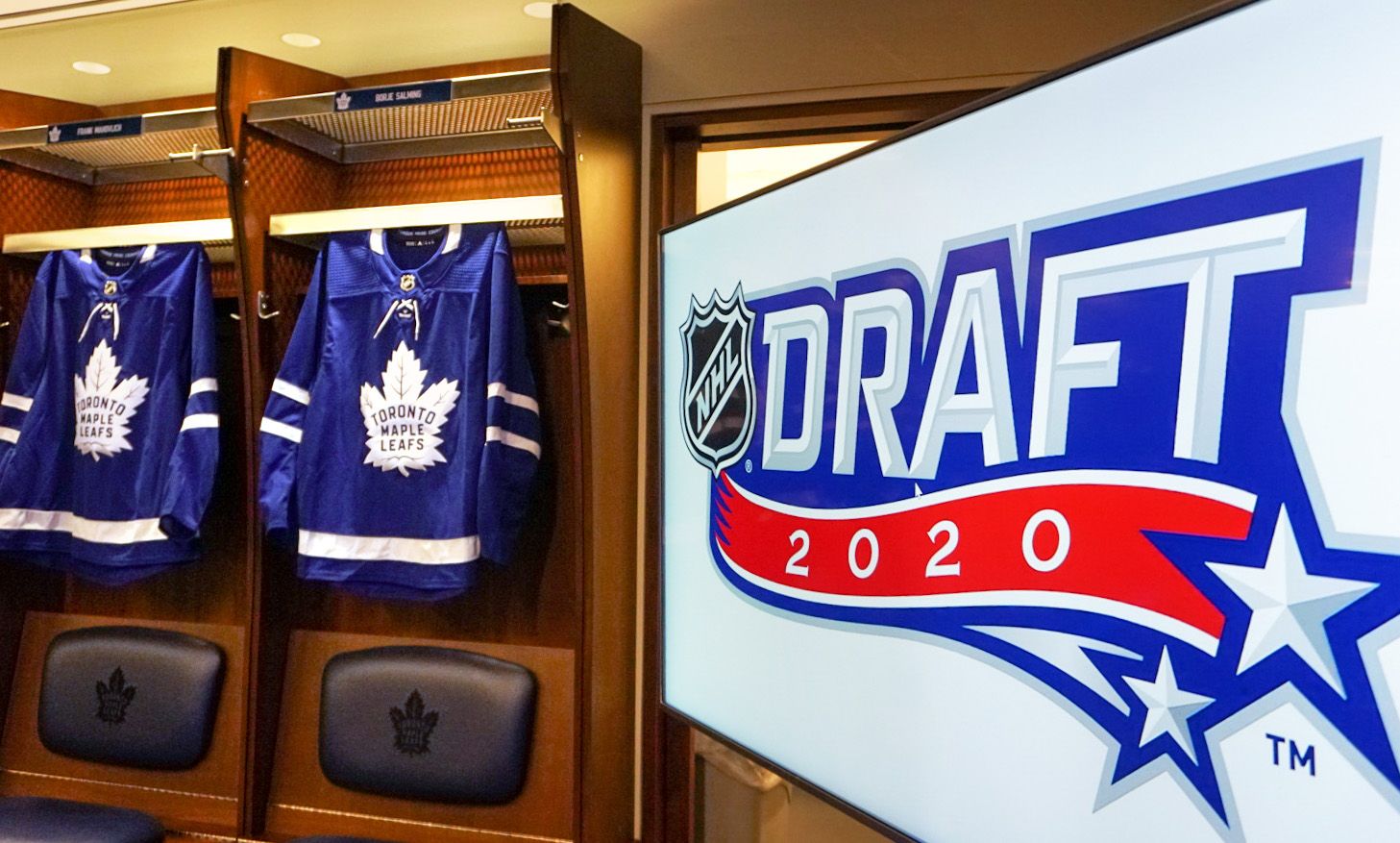
In the upcoming draft, you have three picks. Do you have plans to try to acquire more?
Dubas: We kind of looked at this going into the last draft. That is why we tried to load up on more picks then. In looking at it, and knowing we expected to contend this year, we were moving out picks to try to help our group. Last year, I think we had 12 draft picks. This year, we have three. From October 2020 to July 2021, we will add 15 new prospects to our system — that is the way that we viewed it.
We thought we had a more complete set of information on the players in the October draft. Knowing what was coming with what we expected from our team and thus what was going to happen to our draft capital at the trade deadline, we tried to shift in 2020 to pick players we thought we would have a more complete view on.
That said, we still expect our scouting staff here to do a great job with the three picks we’ve got and be able to return some players. Knowing the work that John Lilley and his staff have put into it, I am confident we will make the most of it.
How would you describe the organizational philosophy going into the draft in terms of the type of player you would like to acquire and any positional needs you might fill through the draft?
Dubas: Positional needs — in the draft, you would certainly like to come out even in terms of wingers, defense, centers, and goalies, but we never also want to sacrifice the best players available or take huge steps backward in terms of how we rate the talent of the player or what their projected future role may be in the NHL just to say we satisfied a positional allotment.
What a player’s position is when he is drafted can also change through development or things of that nature — I’m talking more winger to center or vice versa, as you can’t really change a forward to a goaltender, or at least I haven’t seen it yet. We have tried to balance it out as best we can without sacrificing overall pick value, I would say.
In terms of our philosophy, we are trying to find the best players possible that check off our scouting criteria. Obviously, talent is a key thing, but so is toughness, intelligence, and defensive play. We have tried to follow that here for the last several years.
In 2018, it was a bit of a late change with the changes that came in May. In 2019, I thought we did well. Last year, we are happy with the early returns on our draft day. We will just keep sticking with that. I think our scouts have done a great job and our leadership department has done a great job.
We are always tinkering, looking at areas we maybe missed or didn’t value enough, and rolling from there.
Dubas on the talent in the system: “We had two guys that already did challenge to play in Nick Robertson and Joey Anderson… We expect them to continue to take steps in the right direction”
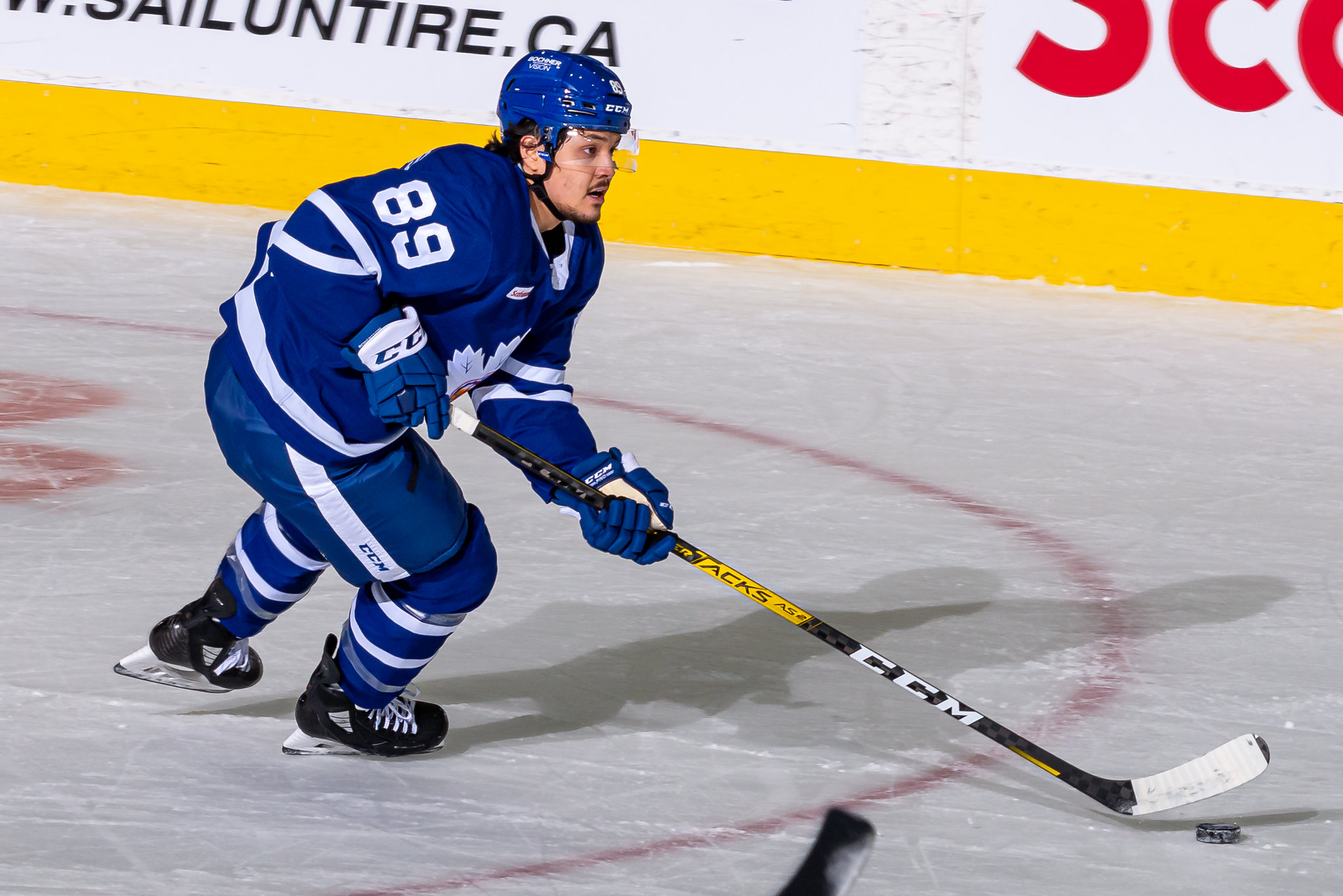
You had Rodion Amirov in Toronto for a month. What did you and the development staff see from him that maybe would lead you to believe he can be a player for you guys sooner rather than later?
Dubas: We signed him at the conclusion of his season in Ufa. He came over while we were still playing, of course, and was around our staff. It was a great opportunity for him to come in. The language is a major element that doesn’t get looked at enough. We are fortunate to have Nik Antropov with our staff here. He can communicate clearly with him.
I was really impressed with how quickly Rodion picked up on the different developmental areas they were trying to work with him on. They — Hayley Wickenheiser, Danielle Goyette, Darryl Belfry, and the staff — just tried to get him set as best as possible to get him set to go back for Ufa’s season. They’re already into the training camp and are a few weeks away from starting there with preseason games and then their season. It happens quickly.
We just wanted to maximize the things we need him to work on so that he can transition over here as soon as possible when he is ready to do so. I think he is going to have a great season with Ufa. It has been really good working with them, actually, as well. They are very open to working with us in terms of sharing information and going back and forth. It has been very, very good. We look forward to him having a great season there.
What players in the system do you believe have the ability to take on a bigger role next year?
Dubas: In the American League last year, with our team, we had two guys that already did challenge to play in Nick Robertson and Joey Anderson. We expect them to continue to take steps in the right direction.
I thought Semyon Der Arguchintsev… He needs to continue to work on his strength, but he had a really good season in the KHL and then came over with the Marlies and I thought played really well. We signed Alex Steeves as a free agent out of Notre Dame. He has been making great progress throughout the summer based on the check-ins we get from him.
On the backend, we are expecting Sandin and Liljegren to continue to push and challenge and take steps there. In addition to them, you have Kristians Rubins and Mac Hollowell, who both had good seasons. Rubins went over and played for Latvia in the World Championships at home, and Hollowell spent some time on the taxi squad traveling with the team last year. They are two completely different types of players, but they’re players we expect to challenge as we move along.
You start to look at some of our younger players from the 2018 and 2019 draft coming into the system as well. That is exciting for us. That said, we feel that depth on both forward and D is an area we need to address in free agency in order to give those young players some competition to make sure that if they are not ready, we have the requisite depth to help out there. We will be active in that market as well.
Dubas on the offseason priorities: “We are going to have some opportunity up front”
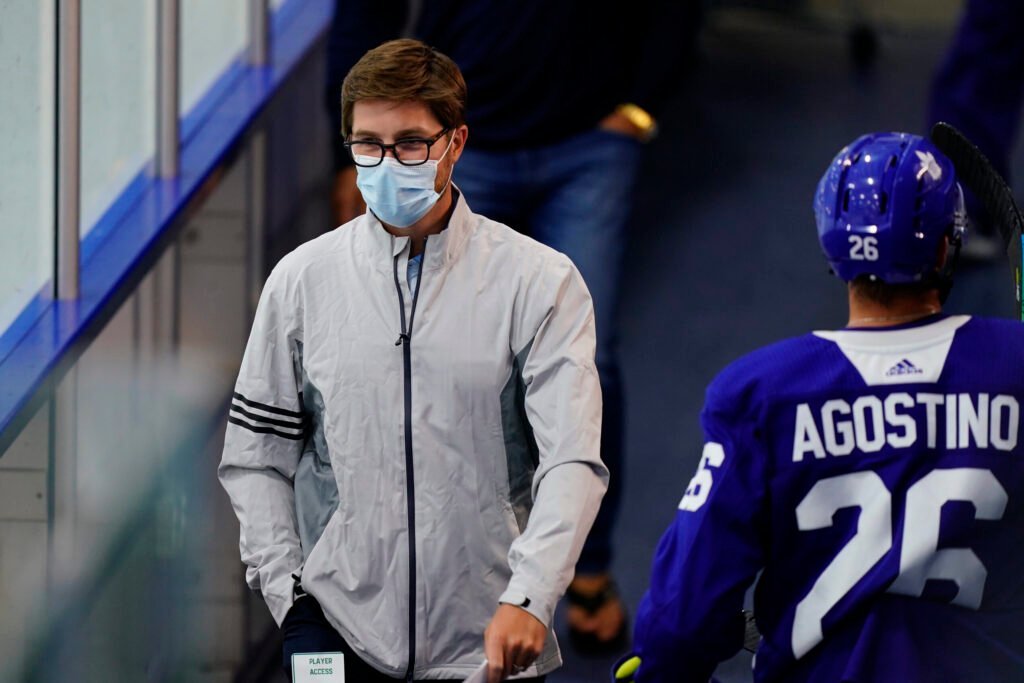
What are you looking to accomplish over this offseason? How do you think you can improve this roster over the coming weeks?
Dubas: In every offseason, regardless of how the season ends, we are looking to improve the team. The needs of the group are fairly obvious to me and probably to people on the outside.
We have a goaltending situation where we need to find a competent partner for Jack Campbell and let them battle it out. Obviously, Jack had a great season. We have a lot of belief in Jack and look forward to him continuing to take steps next year. But we need to address that.
Obviously, we are going to have some opportunity up front, which I think appeals to a lot of the players that are there. If free agency doesn’t bear fruit for us and we don’t think there is value, then we will look at the trade market heading into the season.
It is easy to look now and have question marks. Come September, when camp opens, we will be in a different spot. We were quite happy with the defense last year and how it improved. I think that manifested itself objectively in the number of shots, goals, and the number of opportunities we gave up. We look forward to that group continuing to work together with Dean Chynoweth now coming in to replace Dave Hakstol, who has gone to Seattle.
We have to continue to get better. That is what our full focus will be on. It may look a little bit different because of different things that happen in free agency, but our goal is to continue to improve the team in every possible way that we can.
Where are you, if anywhere, with Frederik Andersen and Alex Galchenyuk?
Dubas: I don’t really like it when negotiations get public. The Hyman one obviously has. We have had communication with both camps. I don’t mean to dodge the question, but I would rather leave it at that. The door isn’t closed on either player.
When you approach free agency not knowing if the cap is going to be flat for not just this year for a few more years, does it make long-term deals harder to figure out or less desirable to want to sign? Do you continue to go with the short-term deals to build around your core for the upcoming year?
Dubas: It all comes down to value. If we think something is of great value, it is long-term, and the player is going to perform at the contract level or beyond all the way down to the back end of a long-term deal, there is no issue on our end.
It certainly is something to consider. That showed itself last year in the free-agent market. I don’t know, with an additional team this year and maybe better prospects of revenue this season, whether there will be a huge change this year, but I still think there is limited space overall. With Seattle coming into the league, it is only one more team and $81.5 million overall in cap space among the 32 teams now. I think that is a challenge.
You have RFAs coming up for different teams that are going to take a much larger piece of the pie. I think we are fortunate here that our core group is locked up for the next number of seasons. We hope that, by that time, things will start moving in the right direction. These are the circumstances that we are in, and we have to make the best of them.
We don’t dismiss anything because of the term. It always has to be about value in that regard. That is the way we will approach here now and moving forward.
Dubas on the direction after another playoff failure: “For better or worse, I believe in this group… I believe that they are going to get it done and that they are going to win”
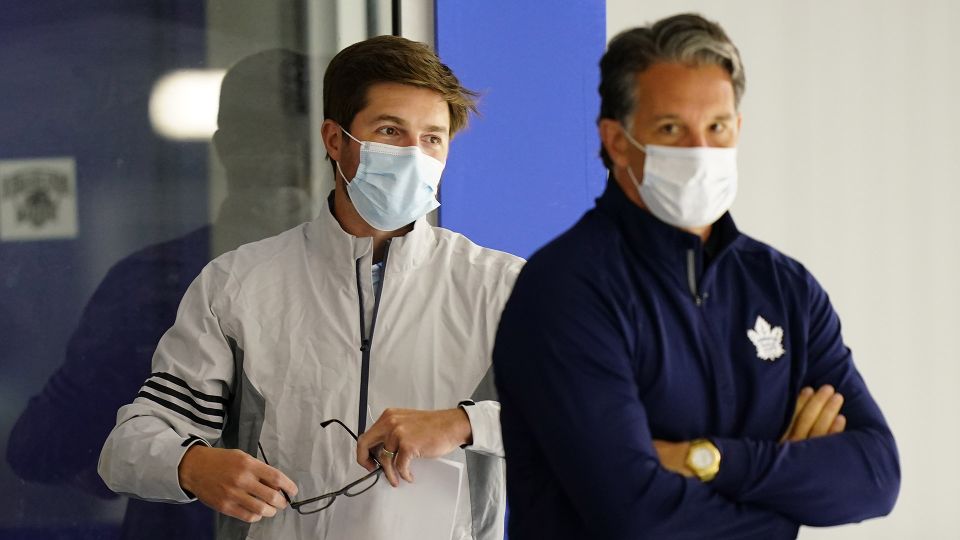
There seems to be a plan, based on the expansion draft, to keep as much of the roster together as you can. How do you reconcile that with what has happened in the playoffs?
Dubas: Fairly simply, I understand that some may look at it and say this group hasn’t gotten it done, thus why there has to be changes. For better or worse, I believe in this group. I believe that they are going to get it done and that they are going to win.
I understand that this comes with certain doubt because we have not broken through in the playoffs, but it is my belief that they will. I believe in them as players. I believe in them as people. I know that the decision lies on me and the risk is for me in going ahead that way.
I am comfortable with it. I believe we are going to see the best version of this group next season that we have seen yet. I am willing to bet everything on that.
How many sleepless nights have you had wondering if one overtime goal changes the whole narrative since June 1st?
Dubas: I have had sleepless nights for other reasons. Once something is over, you try to park it and move past it — not live in that — and look at how can we take this group and push them to break through?
That comes down to me doing my job as best as I can — especially at a time like this where we haven’t met that expectation — in trying to set the group up, whether it’s through internal development or finding the pieces that continue to push us in that direction, in order to have the breakthrough happen.
This is not a job where you have many great sleeps night in and night out, as I am sure others who have done it for far longer can attest to. It is what I signed up for. It is a great challenge we have ahead of us. I am just looking forward to embracing the challenge ahead versus looking at what might have been with a bounce here or there.
What lessons have you and your players learned from the teams that went deep in the final four?
Dubas: I think there is always a lot to learn from teams that have success in every sport. Certainly, in hockey… I am always hesitant on this one. If you answer what you have learned from teams, the response is, “You haven’t had their success in the past.” I never want it to come off as a comparison as well. I will qualify my answer by saying that we are not comparing our team to the teams that had success — even the teams that went to the final four.
What I think we can learn from them is that if you look at our team and where we haven’t been able to break through, in those final deciding games — if you go back and look at all of them back to 2018 — we go into those games and I think we are a little bit passive and on our heels. We are trying to feel out the opposition.
Teams that have success — not just in hockey but in other sports — go out and attack the opportunity. They don’t sit back and wait for the opponent to make mistakes. They go out and exert themselves in the way that they play.
We did that a little bit earlier in the series in Games 3 and 4, and then we had our moments in Game 6, but in Game 7, I thought we were a little bit passive and frozen. I would say the same for Game 5 versus Columbus and the prior Game 7s in Boston the previous two years, and even Game 6 against Boston in 2019 once they tied the game.
The lesson that we learned, and we try to impart throughout our organization, is that in those moments, can we get on the attack, and can we assert ourselves the way that we want to play? We have shown moments of it at times, and I thought we improved upon it this year, but in the end, when it is all on the line, we have to be able to get to that same level.
For those teams, it didn’t just happen for them, either. They had to have their own breakthroughs. That is what we have to work towards here through this offseason, through training camp, and in the regular season in order to get ourselves ready for that.
That would be the key lesson. I don’t know if you saw Julien [BriseBois]’s press conference at the end as well where he talked about the sacrifices that the players of Tampa Bay had made. I thought that was pretty bang on as well. There is a reason they have won back-to-back Stanley Cups.
The power play has faced a lot of criticism. Do you see it more as a tactical thing, or is there a personnel issue that you are going to try to address this offseason?
Dubas: I think that is more of something Sheldon and I have discussed privately and throughout the season. We will discuss now — myself, Sheldon, Dean, Manny, and Spencer Carbery — throughout early in the summer and get ready for the year.
I expect our power play to perform better than it did. I think we all do. Our players do. There is no doubt that. As it has shown at times, it is capable of performing at a very high level. In order to get there, I think we, frankly, need to free ourselves up from getting too far inside of our own heads when things aren’t going well on it and be able to put a stop to it.
As a team, in terms of our overall performance in the regular season, we did a much better job of that than in previous years, but in regards to special teams and the power play, we need to continue to perform at the level we are capable of all the way through the regular season and set ourselves up for the playoffs as all the best teams do.


![Jim Montgomery Post Game, Bruins 4 vs. Leafs 2: “[Marchand] still manages to get under people’s skin, yet he doesn’t cross the line” Jim Montgomery, Boston Bruins post game](https://mapleleafshotstove.com/wp-content/uploads/2024/04/jim-monty-pg-to-218x150.jpg)
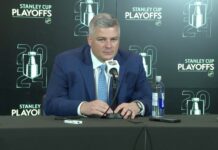
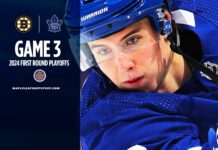
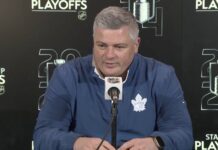
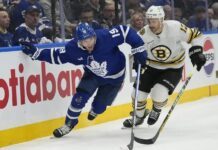
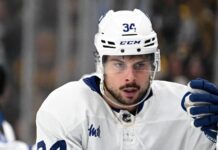
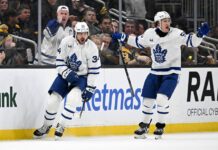
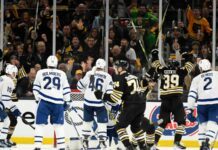
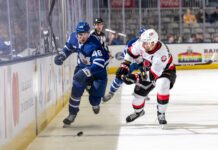

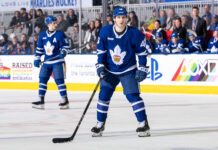
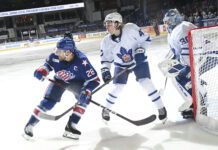
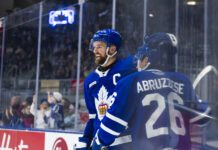










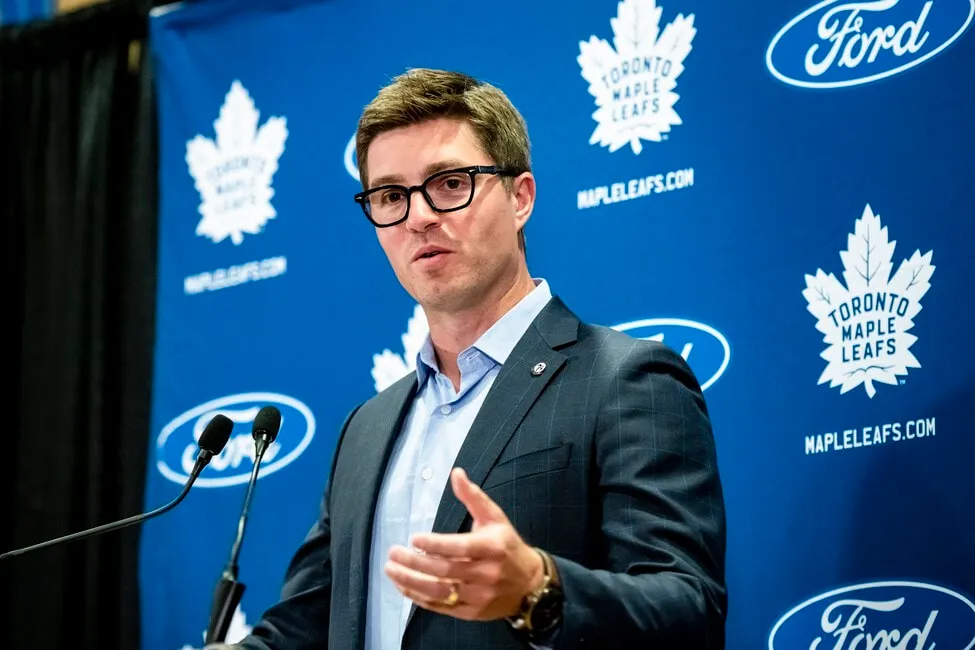
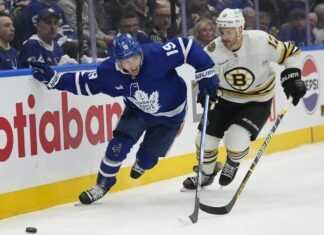
![Jim Montgomery Post Game, Bruins 4 vs. Leafs 2: “[Marchand] still manages to get under people’s skin, yet he doesn’t cross the line” Jim Montgomery, Boston Bruins post game](https://mapleleafshotstove.com/wp-content/uploads/2024/04/jim-monty-pg-to-100x70.jpg)







